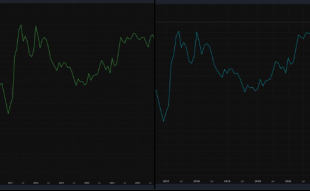Join Our Telegram channel to stay up to date on breaking news coverage
On Monday, June 12, UBS completed the legal takeover of its former Swiss rival, Credit Suisse, creating a giant Swiss bank with a balance sheet of $1.6 trillion following a government-backed rescue earlier this year and a more significant muscle in wealth management.
UBS Group’s newly-returned CEO, Sergio Ermotti, noted in a statement:
Instead of competing, we’ll join forces as we embark on the next chapter of our joint journey.
In an open letter, the bank’s chiefs stipulated that they would not compromise UBS’s “strong culture” or “conservative risk approach.” Further, the risk management failures over several years played critical roles in Credit Suisse’s eventual downfall.
“This is the beginning of a new chapter – for UBS, which calls itself the world’s largest wealth managers, Switzerland as a financial centre and the global financial industry,” UBS Chief Executive Sergio Ermotti and Chairman Colm Kelleher said in an open letter published in the Swiss newspapers.
Today, we cross an important milestone. We have announced the legal closure of our acquisition of Credit Suisse. For more details visit our hub here: https://t.co/ihrGDAgDJM and the media release here: https://t.co/YPj3sf8efG
— UBS (@UBS) June 12, 2023
The bank’s chiefs will further oversee $5 trillion of assets, giving UBS, the world’s largest wealth manager, a front position in critical markets. The merger notably ends Credit Suisse’s 167-year history, tarnished in recent years by scandals and losses.
The two banks jointly have about 120,000 employees worldwide. Although, Ermotti previously warned the new group “won’t be able to create, short term, job opportunities for everybody. Synergies is part of the story.”
UBS has asserted that it expects “Credit Suisse operating losses and significant restructuring charges” to be offset as it ditches risk-weighted assets and forecasts a standard equity tier 1 capital ratio — a measurement of capital against assets — of around 14% for the rest of the year.
UBS Comes To Swiss’ Aid
On March 19, UBS agreed to buy the lender for a knockdown price of 3 billion Swiss francs ($3.32 billion). Sweetening the deal, on Friday, the Swiss government agreed to cover losses of up to 9 billion Swiss francs ($10 billion) after UBS incurs the first 5 billion Swiss francs as part of the transaction, as the bank absorbs a portfolio that does not entirely “fit its business and risk profile.”
Both UBS and the Swiss government have affirmed that the takeover will pay off for shareholders and will not become a burden for the taxpayer. Additionally, the Swiss government has noted that the rescue was necessary in order to protect Switzerland’s standing as a financial centre, which would suffer if Credit Suisse’s collapse triggered a broader banking crisis.
Following UBS’s acquisition, Credit Suisse and its American Depositary Shares will be delisted from the SIX Swiss Exchange and New York Stock Exchange, with shareholders receiving one UBS share for every 22.48 Credit Suisse shares held.
Myths Debunked
Nonetheless, the agreement, which saw the state bankroll the rescue, quashed two myths. These myths argued that Switzerland was predictable and safe and that banks’ problems would not rebound on the taxpayers.
Jean Dermine, a professor of Banking and Finance at INSEAD, stipulated that” it was supposed to be the end of too-big-to-fail and state-led bailout.” He further said that the episode showed this central reform after the global financial crisis had not worked.
On the other hand, Beat Wittmann, co-founder and partner at Porta Advisors, has said the speed at which UBS managed the takeover is positive for the bank. Wittmann told CNBC’s “Squawk Box Europe” that:
Going forward will be “indeed a challenge … but UBS, due to the emergency operation and the collective failure of policymakers and Credit Suisse, got an extraordinarily advantageous deal over a weekend.
Wittmann further noted that ”there’s so much margin of safety in terms of price, in terms of credit lines, in terms of risk sharing with the government, that this is a great deal indeed.”
However, many banks have pared back their global ambitions in response to more rigid regulations since the global financial crisis. The disappearance of Credit Suisse’s investment bank, which UBS has said will seek to cut back significantly, marks another retreat of a European lender from securities trading, now primarily dominated by U.S. firms.
It is worth noting that the combined company will report its first consolidated results on August 31.
Related News:
- UBS Set to Finalize Credit Suisse Takeover, Potential Completion Date in Sight
- Swiss National Bank Ready To Step In To Aid Beleaguered Credit Suisse
- Credit Suisse’s former executive says the US regulatory clarity will start a new bull run
- Crypto markets optimistic over the Credit Suisse crisis
Best Wallet - Diversify Your Crypto Portfolio
- Easy to Use, Feature-Driven Crypto Wallet
- Get Early Access to Upcoming Token ICOs
- Multi-Chain, Multi-Wallet, Non-Custodial
- Now On App Store, Google Play
- Stake To Earn Native Token $BEST
- 250,000+ Monthly Active Users
Join Our Telegram channel to stay up to date on breaking news coverage



